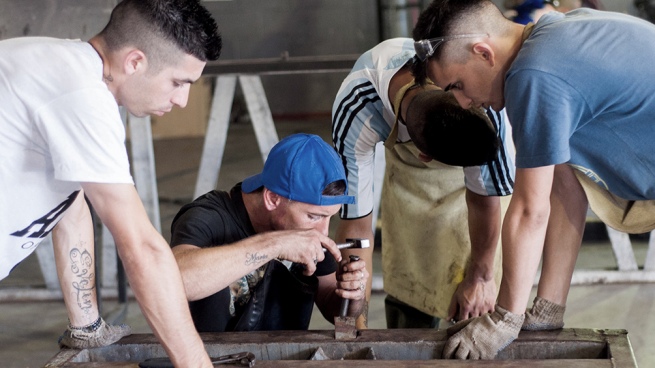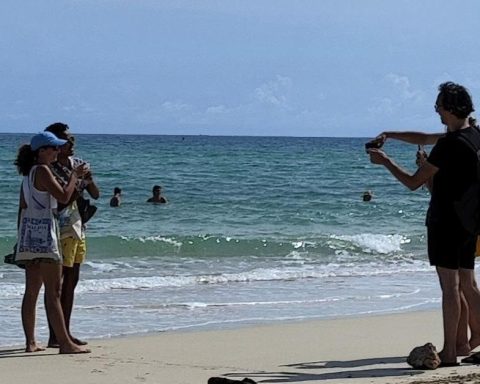Municipal, provincial and university programs offer multiple free training courses in trades What’s up? from masonry, orchard and manicure to electricity, computing and hospitalitymany of which have agreements with companies and unions to improve employability conditions and facilitate the undertaking of personal projects.
Buenos Aires
In Buenos Aires, the Provincial Institute of Labor Training coordinates the 200 Labor Training Centers (CFL) that can be consulted at https://www.trabajo.gba.gov.ar/ipfl/ and they offer free courses on programming, safety and hygiene, home care, carpentry, hair removal, manicure, electrician, welder, mechanics, alarm installer, kitchen, hotel receptionist, protocol and ceremonial, sewing, hairdressing, photography, tax settlement , masonry, beekeeping, bakery and others.
The National University of La Plata also has a School of Trades aimed at people who are not regular students. and who need quality training in a trade or improve their employability conditions to sustain their own life project.
Courses to work in metallurgy, health, construction, clothing, computers, wood, gastronomy, mechanics and services can be taken from the age of 16 on the website https://unlp.edu.ar/oficios.
In Bahía Blanca, the secretary of Culture and Extension of the National Technological University, Roberto Verna, told Télam that “we have integrated the Good Job program since 2007, which are free courses and aimed at the unemployed, among others, “in agreement with local companies and the municipality.
Verna highlighted that they dictate welding with electrode and wire technique, cable man for industrial plants in maintenance, assembly and expansion works, management of forklifts, electrical installations and solar panels, among others.

“We try to prioritize unemployed women with family responsibilities to enter if there are others registered,” he remarked.
Cordova
In Córdoba, the National University (UNC) has been providing free training in thirty specialties at its School of Trades since 2014 such as computer repair, masonry, gas, dry construction, sanitary installations, blacksmithing, construction painting, electrical installations and carpentry.
This year 4,718 applicants were pre-registered, of which 37% were women, sources from the institution said.
The provincial government also has a free program called “Córdoba Me Capacita”, with a quota of 70,000 students and specialties related to metalworking, gastronomy, hotels, construction, agriculture and tourism, among others.
The Provincial University of Córdoba (UPC), meanwhile, has the Open University Program for workshops and trades aimed at the social and solidarity economy, where you can learn to make pizza without TACC, bijouterie, fabrics, mosaics, recycled clothing and looms, among others.
saint Louis
San Luis has had the Eva Perón Provincial University of Trades since 2015 (UPro) and signed an agreement to train operators of state companies that will allow workers to perfect their skills.
The rector of Upro, Joaquín Surroca, said that the agreement consists of “carrying out training on different topics that the San Luis Agua State Society requires and is aimed at all workers with specific topics such as welding, electricity and operation of dams and plants. of treatment, among others.
And he recalled that among its wide range it offers technical degrees in advanced electrician, robotics with orientation in artificial intelligence, design and maintenance of renewable energies, professional kitchen, printing and modeling of 3D parts, plumber, registered gas fitter, upholstery and personal image, among others.
Land of Fire
In Tierra del Fuego, both the province and the municipalities of Ushuaia and Río Grande, in addition to educational institutions, implement programs to promote and recover trades with practical workshops and even learning languages such as Quechua, signs and English for tourism purposes.
The Ministry of Employment and Labor Training of the province centralizes the activities with 13 trade workshops and 21 training courses throughout the year.
Río Grande has an Employment Directorate that incorporated courses on new technologies and communication, cultural products, audiovisual production and community radio, while in Ushuaia the Employment and Labor Training Directorate teaches gastronomy courses with an agreement with the Hotel and Gastronomy Chamber of the city, and the Educational and Labor Training Center (Ceflu) allows training in PC operator, home electricity, furniture design, cooking, gerontological care, health billing, cutting and sewing, sanitary installations, gas operator, welder and event organization .
Chubut
Chubut has the Undersecretariat for the Recovery and Promotion of Employment that coordinates the Vocational Training Centers where carpentry, blacksmithing, electricity, installation of toilets (water and sewage), dry construction, gastronomy and tourism are taught.
“We have training centers in Rawson, Trelew, Comodoro Rivadavia and Esquel, in addition to annexes in small towns in the interior of the province where trades are taught,” Undersecretary Rolando Linares explained to Télam and estimated that “more than 4,000 students pass through the training centers. vocational training”.
The provincial Secretary of Labor pays operating costs with 8 per thousand of the contributions made by private employers for each worker and which is collected in the Special Fund for Labor Police and Labor Training, while “the idea is that the trainings have relationship with the socio-economic needs of each population,” Linares said.
“We work directly with the municipalities, but courses are also channeled through cooperatives, civil associations and even neighborhood associations,” he added.
Neuquen
In Neuquén, the Ministry of Social Development and Labor provides training in hairdressing, barbering, welding, installation of toilets, home electricity, pastry, dry construction, human resources assistant and tire repair, among others.
In some towns in the province “more than half of the people who are going to take the registered gas installer course are women,” sources from the Neuquén government highlighted.
Meanwhile, the job placement program of the capital municipality also offers free courses and follow-up to get a job and managed to get 370 Neuquéns access to their first formal job this year.
Black river
Río Negro has carried out trade workshops through the “Emprende” program since 2005 with proposals such as marketing, electricity, PC maintenance, clothing design, jewelry, baking, blacksmithing and welding, among others.
“The estimate for this year is to reach 860 training courses in trades distributed in 44 places and localities,” the Undersecretary of Social Integration, Andrés Fredes, explained to Télam, noting that the program is coordinated with about 290 community organizations to which “it is expected that approximately 12,000 people will be trained in trades during this year”.

Santa Cruz
Santa Cruz works together with the National Council for Education, Labor and Production (Copetyp) to detect job demands and work on job placement and through the Ministries of Labor and Production implemented a training offer in trades in Caleta Olivia, Puerto San Julián, Las Heras and Rio Gallegos.
“The trades we work in are those linked to the mining sector, ranging from welder, mechanic and electrician, through an introduction called mining collaborator,” Rodrigo Gojan, Provincial Director of Technical Education, told Télam, explaining that “in other areas work trades ranging from textiles to programming”.
mendoza
In Mendoza, the General Director of Employment and Training, Emilce Vega Espinoza, reported that with the Enlazados training program, created in 2021 to function as a bridge between job seekers and companies, “in February of this year, we reached 3,539 registered, thanks to the commitment of the 799 companies”, and said that “that is why we started working on a law to be able to extend the program and better adapt it to the needs of the labor market”.
Jujuy
Jujuy works with three programs linked to “training processes in the promotion of socio-productive networks and access to financing,” the secretary of Popular Economy, Rubén Daza, told Télamreferring to courses for hairdressers, blacksmiths, gastronomy, home caregivers, gardeners and textile trades, among others.
After the training, he said, “subsequently the work is linked with access to available financing according to each undertaking” for which an average of 800 workers are being supported annually.
jump
In the city of Salta, the Municipal School of Arts and Crafts operates with free workshops such as industrial textile machine operator, leather goods, construction carpentry, upholstery, fiber-easy handicrafts, kitchen help, painting design, mosaicism, ceramics, hairdressing, weaving in loom and reading and writing in Braille, among others.
And the Chamber of Senators of Salta sanctioned a week ago the creation of the Provincial University of Administration, Technology and Trades, at the initiative of Governor Gustavo Sáenz, who awaits its regulation to bring a training offer to different localities to achieve the adaptation of the knowledge in technology, knowledge economy, production, industry and mining, at a complementary or secondary level, with a close link to the demands of workers to promote a job opportunity.
The Minister of Economy and Public Services, Roberto Dib Ashur, explained that this university will offer “courses in programming, audiovisual, robotics, drone pilot, and other trades that are in demand today, such as dry construction.”
















